To enhance website ranking on the SERPs, increasing website traffic, etc., a strong SEO link building strategy is crucial. With the increase in the number of websites in the online marketing world, not all of them are relevant to your business. It thus becomes essential to have a plan to avoid link building mistakes so that you do not lose website traffic, have a low spam score, etc. However, managing link building alone can be time-consuming and challenging. For this reason, many businesses outsource digital marketing services and avail of white label link building services to simplify the process. With industry-oriented knowledge and the latest SEO tools available, SEO professionals work on plans & strategies to get quality links to the website. In this blog, let us see the common link building mistakes that need to be avoided to increase users' trust in the business, enhance SEO campaign performance, etc.
8 Essential link building mistakes to avoid
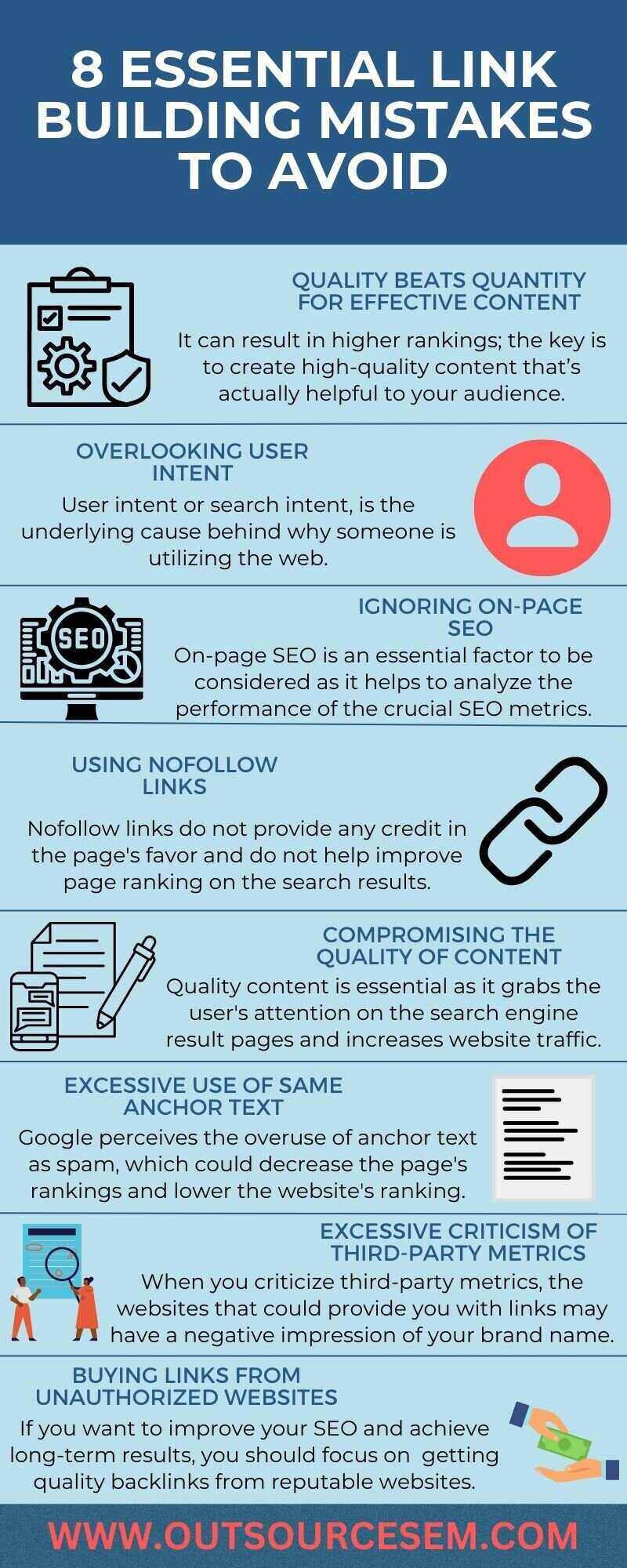
1) Less is more: Quality beats quantity for effective content
Writing top-notch content is necessary for successful link building. But, when it comes to creating content for link building, especially, focus on quality rather than length. When analyzing any data, select only the most interesting or relevant points to ensure readers don't miss the point. If you're deciding what to keep and what to take out, consider what information is being lost and whether it's relevant or helpful.
Long-form content can result in higher rankings; the key is to create high-quality, useful content that’s actually helpful to your audience. It is better to rely on authoritative, useful information to maximize the results from your link building strategy. It would be best if you utilized quality-focused link building tools or outsource SEO services for SEO link building strategies, to ensure your efforts are successful. One must avoid common link building mistakes to optimize SEO efforts. You can also outsource link building services and contact content specialists with expertise in unique content for your website that ultimately helps generate quality links.
2) Overlooking user intent
Not paying attention to user intent is an issue often encountered by website proprietors and digital marketing strategists when analyzing their backlink profiles. The idea that any sort of backlink is beneficial is inaccurate, mainly in the context of understanding user intent.
User intent, or search intent , is the underlying cause behind why someone is utilizing the web. Search engines use a variety of indicators to ascertain a searcher's goal, including the words used in the search query, the websites and pages they've gone on in the past, and their search history. Let us say, for instance, you've created a guest blog post on someone else's website, which enabled you to earn a backlink. So, you must focus on writing engaging content for the relevant target audience and ensure that your posts help you get links.
Apart from Google's algorithm recognizing this lack of relevance, the link that goes to your webpage might be clicked by someone who is at that moment considering the third-party's website but might discover that the content on your page goes against their expectations. This causes them to navigate away from your page quickly, and thus, this is known as a ‘bounce rate’. Should this start to take place on a frequent basis, the bounce rate of your webpage increases and may impact the performance of the essential SEO metrics and reflect negatively on SEO metrics. As a result, this could lead to the page being penalized in the search engine result page (SERPs) . To prevent this eventuality, one must ensure that backlinks with third-party websites are relevant to their own page in an effort to align user intent adequately.
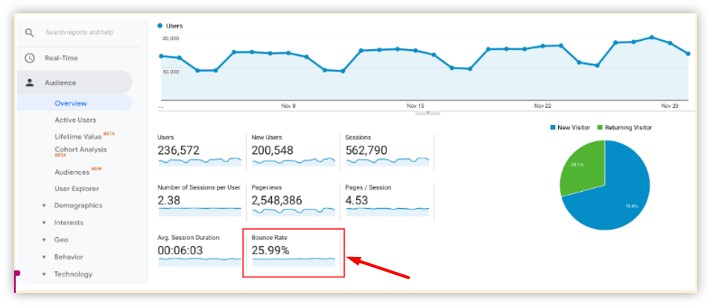
3) Ignoring on-page SEO
Neglecting on-page SEO can be detrimental. The content topic, meta tags, meta description and targeted keyword are crucial indicators to Google about what the page is about. When creating backlinks for the page, it would be advisable to have only links coming in that are related to the same topic, as this helps ensure that Google does not identify the link building process as a part of a link scheme, a black hat SEO technique that might result in penalization. To prevent this, the pages that are linking to the content need to be related to the same topic.
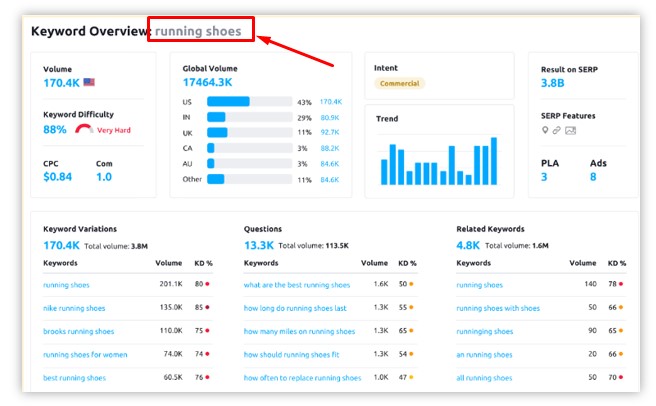
4) Using nofollow links
It is a common misconception that nofollow links do not bring any benefit to a website, with some people only believing that dofollow links are the only ones that have any value. This isn't the case though, as dofollow links tell Google that they should let their crawlers follow the link to see where it leads. On the other hand, these links are an indication to Google that it doesn't need to follow the link. This is a debated topic, as Google typically states that nofollow links aren't followed, yet some sources intimate Google may use them as a ranking factor.

5) Compromising the quality of content
Google prefers websites to gain links through organic link building, which often proves to be a slow process for small to mid-sized websites. While considering link building, organic links should never be ignored. The most effective way to get organic backlinks is to create quality content. This can be in the form of written copy, enjoyable infographics, progressive YouTube videos, or other engaging social media posts. Some brands have succeeded in their online presence by creating viral content, which has helped them gain fame and fortune. The possibilities are endless and determined by the amount of imagination and outreach that goes into the link building process.
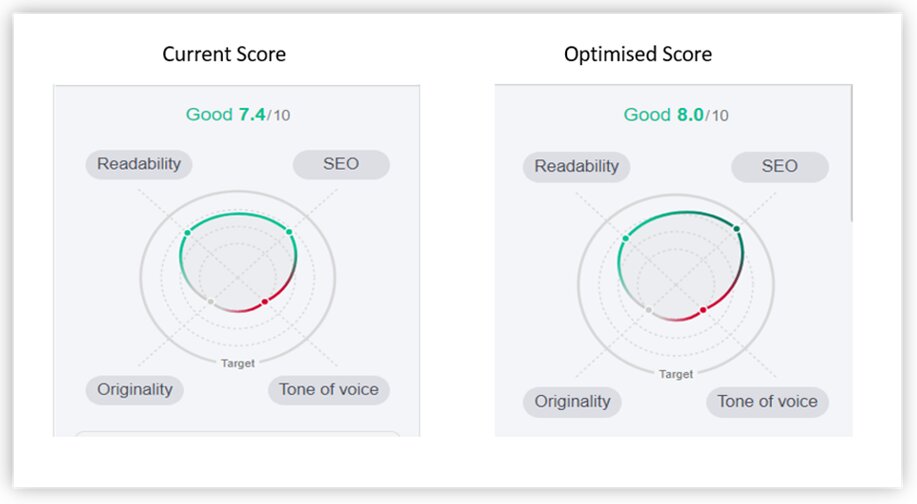
6) Excessive use of same anchor text
Search engine optimizers (SEOs) often use the same anchor text repeatedly to get a higher ranking for their website. Anchor text is the clickable text which is used as a hyperlink connecting to internal or external web pages. Generally, this text appears underlined and changes to blue when the mouse passes over it. It can also feature on images as a link. Including exact link text that matches the website's focus keyword is usually good practice. However, utilizing this same text too often and not varying it can have the opposite effect.
This occurs for two specific reasons. Google perceives the overuse of anchor text as spam, which could decrease the page's rankings. Additionally, if SEOs limit themselves to only one keyword, they could be missing out on a wider range of search terms, and thus they will lose potential viewers.
To avoid these unwanted circumstances, marketers should focus on using different versions of their key terms to categorize more search results and, subsequently, build targeted traffic. By diversifying the used anchor text, they can ensure their website is viewed as credible in the eyes of search engines. Ultimately, this leads to a higher ranking and more considerable click-throughs. When you have same anchor text being used multiple times then there are chances that the search engine bot gets confused on which page to display to the users for the search queries. To avoid this confusion it is vital to choose different anchor text for different results.
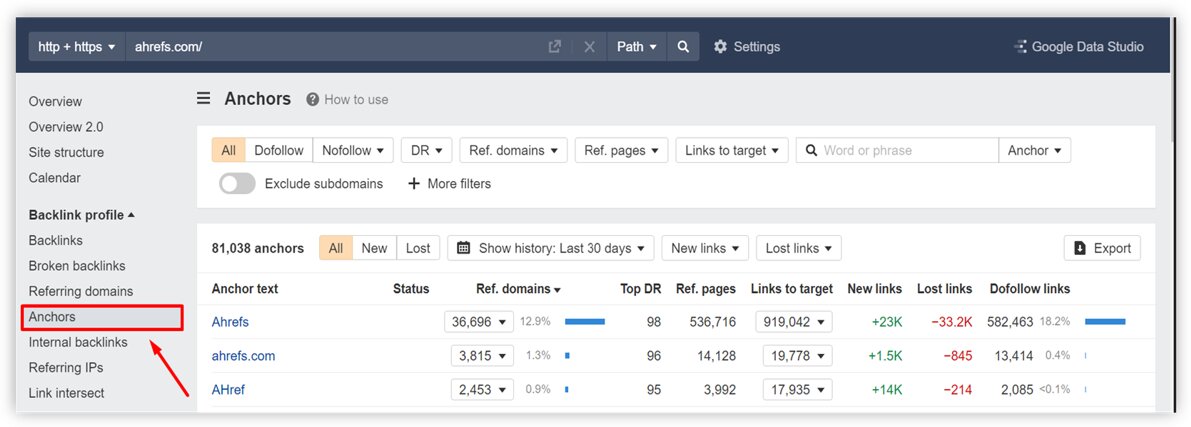
7) Excessive criticism of third-party metrics
When you are looking to build backlinks, there is no denying that sites with high domain authority that are relevant to your niche offer the greatest benefits. However, don’t become overly critical of third-party metrics. Although links containing duplicate content or that are irrelevant should be avoided, there may be some validity to smaller sites that have earned themselves a place in a niche similar to yours and are producing quality content.
Small yet relevant sites may not drastically increase your domain authority on their own. But, several smaller, relevant sites have the potential to increase it significantly. Additionally, smaller website owners tend to be more open to link exchanges, making it easier to build backlinks.
It is important to keep in mind that the true value of a backlink is not always evident immediately. What may seem to be a low-value link now could be worth much more in the near-future. If a smaller site shows commitment in improving its credibility and keeps producing high-quality content, that little backlink could be one of your most beneficial links. The third party metrics are essential to focus as they help work on optimizning the crucial metrics. But you should ensure that you do not criticize these metrics too a great extent as this may impact the website credibility.
8) Buying links from unauthorized or poor-quality websites
When it comes to your website's search engine rankings, sometimes it's better to take the road less traveled. Buying links or excessively exchanging backlinks might seem like a smart move, but Google's algorithm can quickly recognize low-quality or bad links and take appropriate action. Use services with strict backlink quality criteria to ensure you receive links from reputable sources.
Relevant anchor text, high-quality links, and guest blogging are all great ways to increase your link-building count without putting your rankings at risk. When it comes to link placement, quality beats quantity, no matter what kind of tricks you use.
Don't get misled into purchasing links from low-quality sites or link farms. If you want to improve your SEO and achieve long-term results, you should focus on getting quality backlinks from reputable websites. Otherwise, you might be wasting your time and money and your hard work could be better if your site is penalized. Stay ahead of the search engine game and invest in quality links instead of low-cost shortcuts. It is essential to focus on relevant and authoritative websites that are trusted by users. When you have links from these websites the users trust your business offerings which increases the chances of enhanced conversion rate.
%20(1).jpg)
How to fix this problem?
• Evaluate your link building methods and identify any potential issues you may have.
• Correct any errors you can find to enhance your SEO and observe greater search engine ranking over time.
• Utilize analytics and tracking devices to determine the most successful link building campaigns .
• Use keyword research to find the best possible keywords and use them appropriately in your link building process.
• Outreach to reliable websites and create connections for profitable backlinking.
• Utilize various link building tactics like guest blogging, creating social media links and interactions, press releasing and more.
• Monitor your website’s backlinks regularly to detect any potentially harmful links, as these can damage your SEO.
• Exercise caution in your link building process, as search engines can see some techniques as manipulative, and your website will be penalized.
• Aim to derive quality, natural links—not only a high quantity of them.
Final words
Link building is an essential part of search engine optimization (SEO) that should be done wisely. It adds authority to your website and can help your business stand out from the competition. However, there are also some pitfalls to be aware of in order to create successful link building campaigns . One of the main link building mistakes to avoid is building too many links to your website without taking the time to research and create a quality SEO link building strategy. Google deems this type of 'spammy' activity as deceitful and can result in a penalty if the links are not obtained naturally. It’s essential to manually build a substantive but small amount of high-quality links from trusted websites to ensure your SEO link building efforts don't lead to any SEO mistakes. It’s also important to look into where the links come from when building them.
Quality links should come from websites and domains trusted by Google and should be related to your industry. Lastly, you should avoid links from websites with hundreds of irrelevant links that do not have your niche audience. Doing so can seriously damage your SEO efforts and is best avoided by working with a professional link building agency. Hence, the best way is to build organic links through content curation, social media, guest blogging and authoritative blogs. Doing so will help you maximize your SEO results and get a better online presence. Further by hiring our SEO experts you can avail various other SEO services like roofing SEO, painting SEO, flooring SEO, lawyer SEO, HVAC SEO and etc for your home businesses. All these services will further enhance the virtual presence of your website.
References:
• Why most brands fail at link building: Top 5 mistakes
• Top 12 link building mistakes in-house SEOs make & how to avoid the
